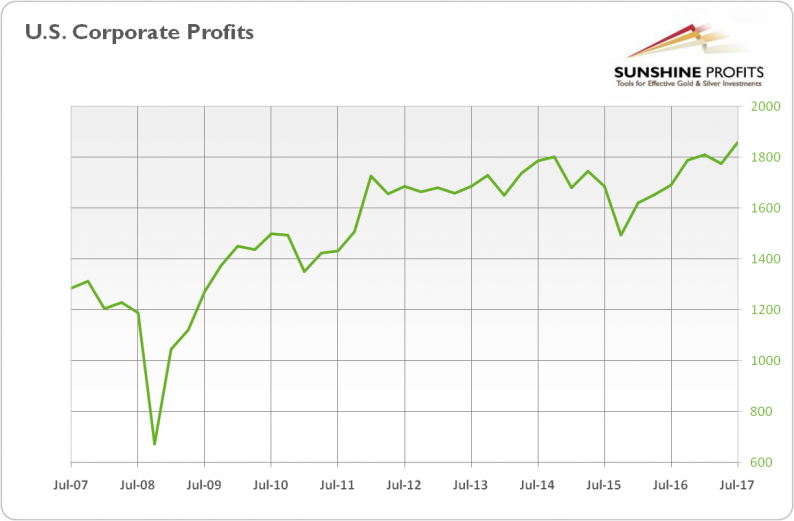The doomsayers have been calling for recession for years. Mainstream economists laughed at them, painting a rosy picture. However, the recent plunge in the stock market strengthened the pessimists’ hand. They interpret the dive as a signal of a coming recession. Is the end of the stock market boom really near?
What Lies Ahead?
The recent stock market turmoil brought traders to their knees. We, of course, covered the descent for our readers, calling for calm. We urged investors not to panic about the free-fall, as it wasn’t driven by any meaningful change in the underlying fundamentals. Actually, corporate earnings have been rising recently, as one can see in the chart below.
Chart 1: U.S. Corporate Profits after Tax (billions of dollars) over the last ten years.

And, indeed, the pullback was temporary and equities recovered over half the decline last week (see Chart 2). However, the question remains: “Was this a healthy correction after months of continuous gains, or the beginning of a great financial calamity?” The answer is crucial – not only for stocks, but also for gold.
The Case for a Downturn
Fed. The main argument for the approaching crisis is the U.S. central bank. It’s not surprising, given that most of the recessions were triggered by monetary policy tightening. Why should it be different now? The Fed is hiking interest rates and unwinding its mammoth balance sheet. Actually, this time may be much worse, as the bank is withdrawing from unprecedented easy monetary policy, including quantitative easing and ZIRP.
And we shouldn’t forget about the Fed’s rationale behind the unconventional monetary policy. The U.S. central bank purchased bonds to encourage an asset-substitution effect. The idea was simple: to make investors shift out of bonds and into equities. The plan worked. It even went too well, as the S&P 500 soared more than 300 percent since 2009 (the chart below displays the rise over the last five years). These impressive gains were partially caused by the economic recovery, for sure. But the exceptionally depressed interest rates and embarrassingly low bond yields also were responsible for the stock market bonanza.











Leave A Comment